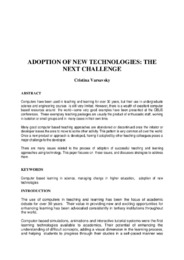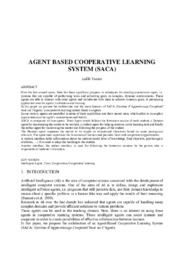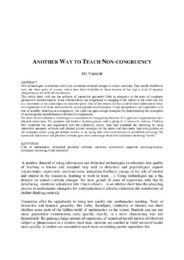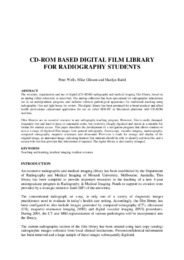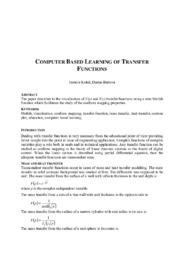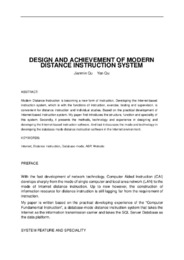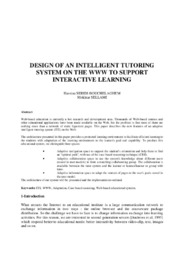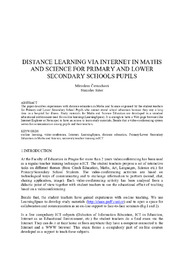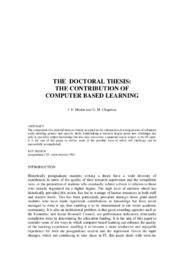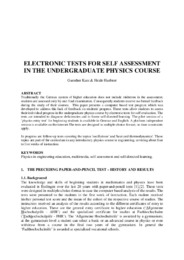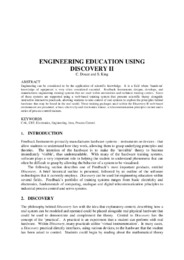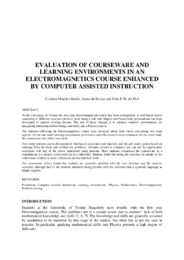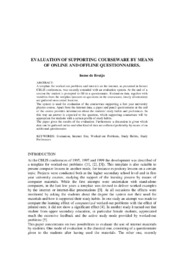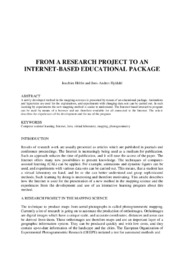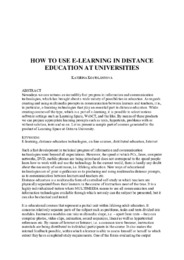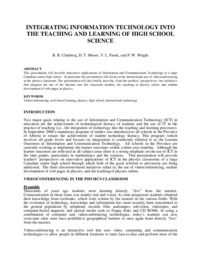Browsing CBLIS Conference Proceedings 2001 Computer based learning in science by Title
Now showing items 1-20 of 48
-
Adoption of new technologies: the next challenge
(Pedagogical Faculty of University of Ostrava, 2001)Computers have been used in teaching and learning for over 30 years, but their use in undergraduate science and engineering courses is still very limited. However, there is a wealth of excellent computer based resources ... -
Agent based cooperative learning System (saca)
(Pedagogical Faculty of University of Ostrava, 2001)Over the last several years, there has been significant progress in techniques for creating autonomous agent, i.e. systems that are capable of performing tasks and achieving goals in complex, dynamic environments. These agents ... -
Another way to teach non-congruency
(Pedagogical Faculty of University of Ostrava, 2001)New technologies in education allow and sometimes demand changes in school curricula. They enable children to look into those parts of science, which have been forbidden to them because of too high a level of required imagination ... -
CD-ROM based digital film library for radiography students
(Pedagogical Faculty of University of Ostrava, 2001)The structure, organisation and use of digital (CD-ROM) radiography and medical imaging film library, based on an analog (film) collection, is described. The analog collection has been specialised for radiographic ... -
Computer based learning of transfer functions
(Pedagogical Faculty of University of Ostrava, 2001)The paper describes to the visualisation of F(p) and F(z) transfer functions using a new Matlab function which facilitates the study of the conform mapping properties. -
Computer support of innovation´s Creativity
(Pedagogical Faculty of University of Ostrava, 2001)Using of algorithmic methods of the intensification of constructive process logically results in an idea for the creation of computer programs capable of raising efficiency of invention and design activity. In a basis of ... -
Design and achievement of modern distance instruction system
(Pedagogical Faculty of University of Ostrava, 2001)Modern Distance Instruction is becoming a new form of instruction. Developing the Internet-based instruction system, which is with the functions of instruction, exercise, testing and supervision, is convenient for distance ... -
Design of an intelligent tutoring system on the www to support Interactive learning
(Pedagogical Faculty of University of Ostrava, 2001)Web-based education is currently a hot research and development area. Thousands of Web-based courses and other educational applications have been made available on the Web, but the problem is that most of them are nothing ... -
Designing applets that foster constructivist teaching and learning
(Pedagogical Faculty of University of Ostrava, 2001)The Modular Approach to Physics (MAP) project makes extensive use of “educational objects” which include Flash animations, Java Applets and Java Applications. A paramount concern in the design of these objects has been to ... -
The development of modeling skills through computer based simulation of an ant colony
(Pedagogical Faculty of University of Ostrava, 2001)Learning in science can be analyzed into a number of constituent components: the acquisition of experiences with natural phenomena provides the basis for the subsequent development of concepts; the mental representation ... -
Distance learning via internet in maths And science for primary and lower secondary schools pupils
(Pedagogical Faculty of University of Ostrava, 2001)The paper describes experiences with distance education in Maths and Science organised by the student teachers for Primary and Lower Secondary School Pupils who cannot attend school education because they stay a long time ... -
The doctoral thesis: the contribution of computer based learning
(Pedagogical Faculty of University of Ostrava, 2001)The completion of a doctoral thesis is widely accepted as the culmination of a long process of advanced study entailing generic and specific skills. Undertaking a research degree poses new challenges not only in specialist ... -
Electronic tests for self assessment in the undergraduate physics course
(Pedagogical Faculty of University of Ostrava, 2001)Traditionally the German system of higher education does not include midterms in the assessment; students are assessed only by one final examination. Consequently students receive no formal feedback during the study of ... -
Engineering education using Discovery II
(Pedagogical Faculty of University of Ostrava, 2001)Engineering can be considered to be the application of scientific knowledge. It is a field where ‘hands-on’ knowledge of equipment is very often considered essential. Feedback Instruments designs, develops, and manufactures ... -
Evaluation of courseware and learning environments in an electromagnetics course enhanced by computer assisted instruction
(Pedagogical Faculty of University of Ostrava, 2001)At the University of Twente the first year electromagnetism course has been restructured. A web-based course consisting of different exercises (most of them using a link with Maple) and PowerPoint presentations has ... -
Evaluation of supporting courseware by means of online and offline questionnaires
(Pedagogical Faculty of University of Ostrava, 2001)A template for worked out problems and tutorials on the internet, as presented in former CBLIS conferences, was recently extended with an evaluation system. At the end of a session the student is prompted to fill in a ... -
From a research project to an internet-based educational package
(Pedagogical Faculty of University of Ostrava, 2001)A newly developed method in the mapping sciences is presented by means of an educational package. Animations and hypertexts are used for the explanations, and experiments with changing data sets can be carried out. In ... -
How to generate clever questions and why
(Pedagogical Faculty of University of Ostrava, 2001)Teaching/learning process can be improved by using clever questions. This idea is remarkably old. Since ancient Greek philosophers used questions while carrying on dialogues with students in order to make them clever. Generally ... -
How to use e-learning in distance education at Universities
(Pedagogical Faculty of University of Ostrava, 2001)Nowadays we can witness an incredibly fast progress in information and communication technologies, which has brought about a wide variety of possibilities in education. As regards creating and using multimedia prompts in ... -
Integrating information technology into the teaching and learning of high school science
(Pedagogical Faculty of University of Ostrava, 2001)This presentation will describe innovative applications of Information and Communication Technology in a large Canadian senior high school. In particular the presentation will focus on the instructional use of videoconferencing in ...
